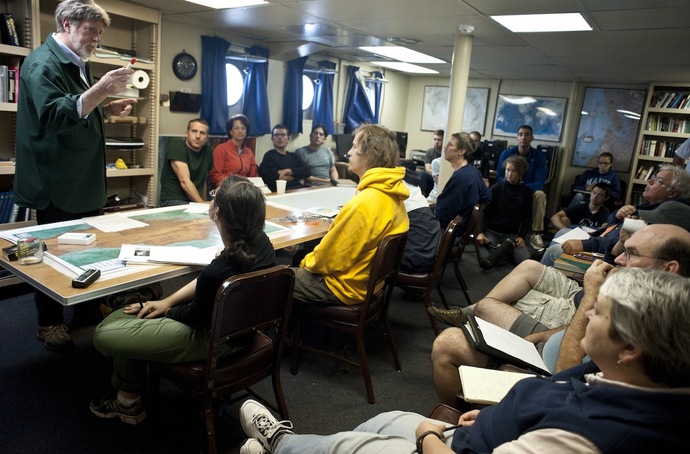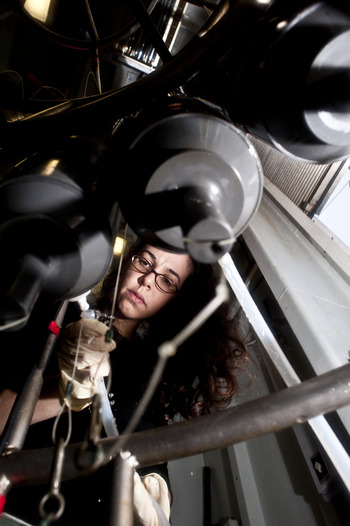The reality of working at sea, especially in an area that is prone to bad weather, is that things don’t always go as planned. We have spent the past two and a half days unable to put Jason in the water due to the sea state and high winds. Luckily, the weather has improved and we will be able to continue our surveys of Axial Seamount with Jason this evening at 2000h.
The students on board for this leg of Enlighten '10 have been gaining the experience inherent in sea-going research of having to adjust their research priorities and goals as the operations on the ship are forced to change. Even though we haven't had Jason in the water for two days, the students continue to learn intellectual and practical skill sets by immersion into shipboard life. They have been attending multi-disciplinary talks and discussions, they are gaining hands on experience reading maps, looking at weather forecasts, and helping with CTD casts, and they are learning how to collaborate with one another on their research efforts. For those of us that have spent more time at sea, it is refreshing to track the experiences of these students as they evolve throughout the cruise. Different students react in different ways to the experience, but at some point, it seems that they all reach the realization that they are participating in a truly unique and potentially life-changing experience.
Below are impressions from four of the students that have been onboard since our port stop in Newport:
 |
It is unfortunate that many people do not see how very essential the exploratory side of the scientific process is. The dogmatic way science has traditionally been taught in school leads many students to believe that it is intimidating and stodgy – a field mired in black and white, right and wrong. When this detracts creative minds it is a travesty not just for the students, but for the discipline as a whole. In reality, creativity, free thought, and quite frankly, rebellion, are key to novel scientific thought. Truly, the scientists who have most impacted history were iconoclasts and freethinkers. It was their ability to look beyond the norm that has enriched the scientific community and changed the way we all experience our world.Experiences like this are why I went into science. Sharing a ship with amazing minds, rocking in rhythm with the ocean, and knowing that 1500 m beneath our feet a whole alien ecosystem is operating, is thrilling and humbling. I feel very lucky to be here, not only because of the amazing scientific opportunities provided by this cruise, but because this cruise truly epitomizes what is unique and wonderful about scientific research – discovery and creativity.
Science is all about going out and playing - being creative, asking as many questions as possible, and not taking anything for granted. Out here in the field, we are constantly learning and experimenting. The fact that people of all ages can watch this process is a tremendous step in breaking down the rigidity that many people associate with the sciences. I look forward to the new discoveries waiting to be stumbled upon over the upcoming days, and am even more excited for the public to be able to watch as this happens and realize that all of this is within their reach as well.
-Brett Dennis-Duke, Macalester College graduate
 |
The main lab onboard is a scene of constant work and dedication, with most of our scientists barely moving from their work stations. Time enters a new dimension as most of us are more familiar with GMT time than Pacific Daylight Time, and day and night are determined by whether your cabin light is on or off. While my first impression of the cruise was “Why is this boat trying to kill me?” once my body stopped the civil war it was waging, I found it easy to perceive the underlying sense of discovery and breakthrough on this cruise. What we’re proposing to do on this and future expeditions does not have the comfort of having been done before, but such a lack of security in the known is what drives these operations on. Creating an undersea laboratory on the most volcanically active spreading center in the Northern Pacific – who wouldn’t want to know what’s going to happen?Like the subject of our study, oceanography research is strikingly fluid and dynamic. While a researcher may come onboard with a set of plans, he must be adaptable and ready to change his plans as the circumstance demands. Oceanography has the unique characteristic that our field research is often at the mercy of its subject matter, meaning the resulting operations are ever-morphing; planned, but with enough leeway for the unplanned.
-Carla Stapleton, UW undergraduate student
 |
Before I came aboard, I had a clear idea of the expedition objectives, but I was still unsure of how I would contribute. After taking the Event Logger chair in the Jason control van, my responsibilities became blindingly clear. I log all of Jason’s operations! I can even command Jason’s cameras to take still photos. The navigation monitor to my left allows me to note the beginning and end of each survey line. The LCD monitors in front of the Engineer, Pilot, and Navigator show Jason’s many camera angles that I use to help distinguish lava morphologies. The dark volcanic terrain outlined by vibrant bacterial matting looks extraterrestrial. Being on watch in the control van is like working on a Mars rover mission except with more to see. This comparison leads me to agree with John Delaney; oceanography should be as well funded and celebrated as the space program.
I have the opportunity to create my own research project. I formed a question that seemed simple, doable within the expedition period, and most importantly interesting. Ever since my first talk with Allison Fundis, I wanted to do something with lava morphologies. Her paper and talks with Deborah Kelley inspired me to do a comparative study of lava morphologies and their percent cover at two hydrothermal vent sites. This data will allow clearer understanding of the effusion and flow rates of the last eruption and see if they differ at the sites. Now, whenever I see a lava flow, I imagine how it looked when it first erupted. With this image in mind, the thought of laying cable in the caldera of Axial volcano becomes even more impressive.
-Diane Perry, UW undergraduate student
 |
When I boarded on this cruise for the first time, I knew that I would experience a whole new journey in my life. Two major feelings dominated my mind in the first few days: cultural shock and seasickness. Working with scientist or professional was not something very new for me, but working with a group of scientists and professionals made me excited and at the same time, nervous. Being one of the few undergraduates on the cruise, I realized the lack of knowledge and in me compared to the colleagues who I would be working with. My very first impression to them was a group of 'superior beings' who have their clear individual visions and know exactly what they should or could achieve. Compared to them, I, who would always confuse and hesitate, never thought of any clear vision in my life and the steps to accomplish my vision. Furthermore, growing in an educational environment which emphasized on passing examinations and constructing correct answers for the sake of gaining points in tests made me a person who was deprived of her critical thinking skills and intense curiosity. As the result, these weaknesses made me hard to adapt to the environment where people would encourage you to ask a lot of questions and think critically on every issues. Therefore, during the first day of the cruise, I was out of place! I could not find any sense of belonging here because all things and people that I encountered were totally alien to me. Besides that, as a Malaysian student who just came to the US for barely a year, my lack of language proficiency silenced all my urge to interact and share my thoughts. Nevertheless, somewhere in my mind, I understood that being passive would not be doing any good to me. Thus, I believed that my journey here was to learn how to be a person who has her own vision and courage to connect herself to the new community! Despite of all the feelings of cultural shock and nervous, I saw the hope of improvements in terms of my personality and skills.
If I was given a chance to describe how I felt physically for the first few days, the main feeling that came to my mind was “I am so sick!” I knew that I am going to learn something 'new' on this cruise. Yet, other than learning new knowledge and skills, this “new thing” appealed to be the unexpected and unique “seasickness”. Before I came abroad, I was confident that I would not be affected by seasickness because I used to travel on ferries and boats in my hometown and I never had such syndromes. When I started to experience the unprecedented dizziness and uneasiness, my confidence vanished into the thin air. I could feel the full impacts of the constantly moving world and somewhere in my mind, I had nurtured the longing for lands. At that moment, I really wished that I was still sleeping soundly without being woken up by the vigorous motion of the ship. Yet, anything that was done cannot be undone. This is not the place for me to regret, ponder and retreat. Instead, this is the place that I should move forward and overcame any obstacles that came into my way.
A high school teacher once told me that life is just about solving problems. On this cruise, I finally understood what he meant. My first experience of the cruise not only provided opportunities for me to widen my world and sharpen my skills, but also forced me to face the hardships directly. Problems such as cultural shock and seasickness are there for me to solve or in other words, conquer. In the end of this journey, I strongly believe that I will become a different person who have clear aims in her life and will always move forward to create a better future!volcano becomes even more impressive.
-Lim Yih En, UW undergraduate student


